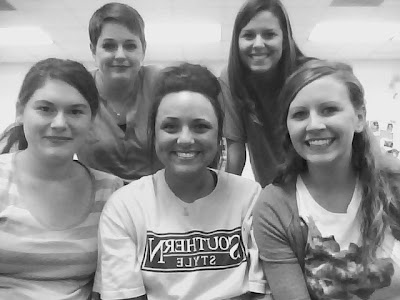We are senior Elementary Education majors at the University of Southern Mississippi. Three of us (Melanie, Allison, and Whitney) are regular K-6 education majors and will be student teaching in the fall. The other two (Donya and Ann) are Special Education majors.
Allison: From Pascagoula MS who would like to teach math ONLY in upper grades. She enjoys eating and being at home on the beach. (Front row - far right)
Ann: From Annapolis MD who would like to teach between 3rd-6th grade. She is flexible about what subject she would want to teach. she enjoys being with her family and friends and watching sports( Back row- far right)
Melanie: From Foxworth MS who would like to teach lower elementary grade. She would like to teach language arts. She enjoys spending time with her family and just getting out of the house every now and then. (Front row- far left)
Donya: From Seminary MS who would like to teach upper elementary grade. She is special education so she will teach it all! She enjoys being outdoors and traveling. (Back row- far left)
Whitney : From Jackson MS who would like to teach any grade and any subject. She enjoys dancing (ballet, jazz, and hip hop) any free chance she gets. (front row- middle)
Teaching Challenge:
How to gain the students respect as a "teacher" when you are not the sole authority. If you do not want to step on the teacher toes how can you manage a classroom effectively?
NOT your Classroom:









